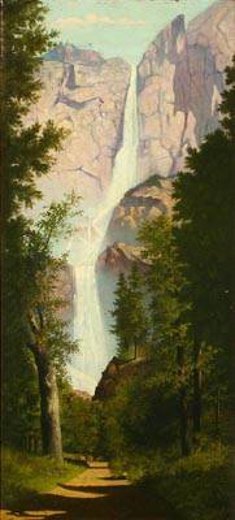Deborah J. Ross's Blog, page 78
October 12, 2018
Author Interview: Tara Gilboy
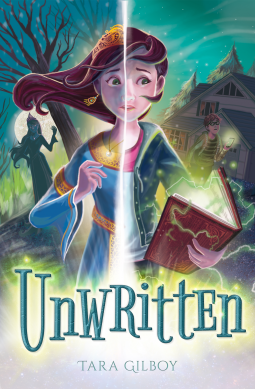 Please welcome Tara Gilboy, a Middle Grade author whose novel, Unwritten, comes out on October 16*. My review of it is here. Stay tuned for her upcoming blog post on writing for Middle Grades, too!
Please welcome Tara Gilboy, a Middle Grade author whose novel, Unwritten, comes out on October 16*. My review of it is here. Stay tuned for her upcoming blog post on writing for Middle Grades, too!
Deborah J. Ross: Tell us a little about yourself. How did you come to be a writer?
Tara Gilboy: I am, first and foremost, a reader. Books and stories have always been one of the most important things in my life, and I’ve wanted to write pretty much since I learned to read. I still have some of the stories I wrote in elementary school. My mom recently gave me a letter I wrote to a publisher when I was in third grade, asking if I could write books for their series. (Apparently she never mailed it!) Unfortunately, until I was in my twenties, I had never actually met a writer, and so writing started to seem like this kind of “impossible dream.” Then in college, I took some creative writing classes, published a couple short stories, and worked as an editor at a literary journal, and I realized: “Hey, I can really do this!” I completed my MFA in creative writing at the University of British Columbia, which ended up being very humbling and also one of the most formative experiences of my writing life.
DJR: What led you to write MG and how is it different from YA or adult fantasy?TG: Even though I have always loved children’s books and read tons of middle grade (and actually my first ventures into writing were always in middle grade, which is what I wrote for fun), when I was in college and started seriously pursuing writing, I focused on adult fiction. I am embarrassed to admit that I was a bit of a literary snob, and I had these really pretentious ideas about writing. My sense of story was virtually nonexistent, I sneered at plot, and I was writing a lot of “purple prose,” these kind of overwritten sentences, way too much description and exposition. But a lot of my stories left me feeling cold. I wasn’t in love with the stories and characters. I remember in my first year of my MFA at UBC, I was taking a novel-writing workshop and working on an adult novel that was this really serious historical piece about a marriage and a woman finding herself within her marriage. I was really struggling with it and couldn’t wait for the workshop to be over so I never had to look at the novel again. At the same time, I was taking a class on writing children’s books and reading all these amazing middle grade novels and having wonderful class discussions about them, and I realized that I was happiest when I was writing these kinds of stories. At the end of the first year, I changed my thesis genre and never looked back.
I think middle grade differs from adult fantasy (and to some extent, YA), in that it is really condensed into its essential elements – there is no room to digress or go off on tangents or you risk losing your reader. Middle grade readers have great eyes for what actually needs to be there in the text, and when I am writing middle grade, I am ruthless about cutting. I am also very careful about structure and pacing when I am revising. I want to keep the reader turning pages without making things feel too rushed. The focus is always on telling a good story, which is what I love so much about these books. I also think middle grade tends to look inward, where characters really make sense of their own identities, who they are, whereas in YA, the books tend to look outward, with the main characters finding their place in the world, which makes sense, since YA readers are often on the cusp of leaving home in just a few short years.
DJR: What inspired your book, Unwritten? How do you see it in relation to current MG?TG: Unwritten started in a rather unusual way. I had written a different book for my MFA thesis, and I found an agent for it pretty quickly, so I really had my hopes up when it went out on submission, and then …. Nothing. It didn’t sell. This shook my confidence as a writer, and I was starting and stopping a lot of projects and feeling insecure about my writing. Finally I decided to write something just for fun, something that was just for me, that I never planned on showing anyone, as a way to make writing fun for myself again. Unwritten was my “just for fun” project.
At the same time, I kept having this recurring nightmare where some sort of supernatural entity was coming after me, and I had to pack up whatever I could fit into my car and run away forever. That dream was initially my starting point in the story; in the early drafts, the story opened with a stranger arriving in the middle of the night and telling Gracie and her mother that they have to flee. (I think my original opening line was “The pounding shook the house” as this stranger knocks on the door.) Later, as I continued working on the novel, I realized that in order for readers to feel invested in that moment, they needed to know more about Gracie first, so the scene got pushed back into what I think is now chapter four or five, and it eventually evolved into something completely different. But the origin of this story was me exploring who Gracie was running from and why, as well as giving myself permission to play around with these ideas without pressuring myself to write something with the end goal of publication in mind. I think because of the premise of the book, people often assume I must have started with the “story-within-a-story” idea, but that actually wasn’t the case.
There is so much wonderful middle grade coming out right now, so much of it turning inward to explore themes like identity and where we belong within our families and friendship groups. I think Unwrittenfits within current MG in that it really focuses on Gracie’s inner journey as she figures out (quite literally) who she is, where she comes from, who she will be going forward. Though her situation is unusual, the universal emotions she explores are ones that recur frequently in middle grade because they are so important to this age group (and to all readers).
DJR: What authors have most influenced your writing? What about them do you find inspiring? TG: I think this answer varies depending on the project I am working on. With every project I write, I always have a set of “mentor texts,” books that may be similar in style or theme or premise to the one I am undertaking, and I study them closely to examine what worked well in these books and how the authors handled different issues that I may be struggling with. When I was writing Unwritten, I read every book with a “story within a story” and characters coming to life that I could get my hands on (they were surprisingly hard to find!). For the project I’m working on now, which has some gothic elements, I’ve been reading classics like Bram Stoker’s Dracula and Mary Shelley’s Frankenstein as well as middle grade books with gothic undertones like Laura Amy Schlitz’s Splendors and Glooms and Jonathan Auxier’s The Night Gardener. For overall influence, though, JK Rowling and Kate DiCamillo have been big influences on me. Their books have this lovely classic feel to them, in the language, in the sense of wonder, in the magic.
DJR: Why do you write what you do, and how does your work differ from others in your genre?TG: I never thought I’d be a fantasy writer. When I was in elementary school, I was fascinated by historical fiction. I read Laura Ingalls Wilder’s Little House books over and over again, as well as Frances Hodgson Burnett’s A Little Princess, and if a book had pioneers in it, it was for me. I love learning about history (Colonial Williamsburg is my absolute favorite place in the world!), and so when I first began writing for children, I assumed that I would write historical fiction. I started and stopped many, many historical fiction projects, but I kept petering out in the middle. I’d stall in the researching phase, or I’d freeze if I couldn’t get a detail right, or I simply would get stuck devising a plot. Writing was beginning to feel like “work” for me, but I was reading a lot of fantasy at the time, and so I started playing around with writing some. I loved the fun and freedom and magic of asking myself these completely off-the-wall “what if?” questions and then exploring how I could possibly pull them off in a story. What if a doll was alive? What if a girl was really a storybook character? What if I could travel in time? They were the kinds of questions I realized I had been asking myself and daydreaming about ever since I was a little girl, the kinds of questions we all ask ourselves as children when we have this enormous capacity for curiosity and wonder. I think that’s what draws me to fantasy. The story possibilities are endless, and I never struggle to find ideas the way I did when I was writing historical or contemporary realistic fiction.
I’m not really sure how my work differs from others in my genre. I tend to write fantasy rooted in reality, rather than high fantasy where there is so much world-building involved. I deeply admire writers who can create these wonderful magical worlds (JK Rowling immediately comes to mind), but I’ve always written about worlds very similar to our own, with just a few magical elements.
DJR: How does your writing process work?TG: I am a huge fan of Anne Lamotte and swear by her “sh---y rough draft” advice. My first drafts are the biggest piles of garbage you’ve ever seen, and I am always secretly terrified that someone is going to see them before I have a chance to revise and think “wow, she’s a terrible writer.” I play around A LOT when I am writing, and my first drafts are all about exploring my plot and characters and letting them take the story in different directions rather than trying to stick to a rigid outline. Once I start getting further into the story, and have a solid fifty pages or so, I start to do a bit more outlining, but usually it’s only a brief list of the next few scenes and what needs to happen in each. I may have a general idea of where the book is headed, but when I try to force a book to end a certain way, things start to unravel pretty quickly because my characters’ actions don’t feel natural to them. Anne Lamotte writes in Bird by Birdabout an E.L. Doctorow quote: “'Writing a novel is like driving a car at night. You can see only as far as your headlights, but you can make the whole trip that way.' You don't have to see where you're going, you don't have to see your destination or everything you will pass along the way. You just have to see two or three feet ahead of you.” That’s pretty much how I write. And I always start my writing day by reading for half an hour or so of a book I love. It’s the only way I can get into the right frame of mind to write.
DJR: What have you written recently? What lies ahead?TG: When I finished Unwritten, I went through a long stretch of time where I was starting and stopping projects and not being able to stick with any one story. I worked on a ghost story about a haunted doll, nonfiction, some picture books, a historical fiction about pirates, science fiction set in the near future, and a middle grade about a mermaid. I may return to some of these projects at one point, but none of them were really holding my attention the way they needed to: I was drifting and feeling a bit lost. I am now halfway through the first draft of a book I am really excited about. It’s a fantasy, and it has a lot of gothic elements. I am having a lot of fun playing around with the creepy setting and gothic tropes.
DJR: What advice would you give an aspiring writer?TG: Find a workshop group full of people you trust. It will be your most valuable asset as a writer. They should love your work but also push you to make it better. I have a very difficult time developing a revision plan on my own, and my critique partners are always helping me, by closely reading my work, suggesting what needs to change, and also helping me find the “gems” in my stories – the best parts that I can flesh out more and bring to the forefront. The people in my workshop group have become some of my dearest friends, and we are always cheering one another on, commiserating one another on failures, and chatting for hours about storytelling. They are the best! I don’t think I could have written this book without their support. It can be tough to find the right workshop group, though. My number one rule is this: you should always leave a workshop session feeling energized and excited to get to work on your revisions. If you feel dispirited and discouraged, something may be off about the dynamic of the group. They shouldn’t be giving only praise, but they should definitely be telling you what you are doing WELL along with what needs to change. And that’s not just because of ego or hurt feelings. There is no way a writer can successfully revise without being aware of what parts work well and resonate with readers. Those are the parts we want to expand on and strengthen.
Middle Grade author Tara Gilboy holds a Master of Fine Arts in Creative Writing from the University of British Columbia, where she specialized in writing for children and young adults. She teaches creative writing in San Diego Community College's Continuing Education Program and for the PEN Writers in Prisons Program.
*You can order signed copies through Mysterious Galaxy: https://www.mystgalaxy.com/book/9781631631771Otherwise, it's also available at Amazon https://www.amazon.com/Unwritten-Tara-Gilboy/dp/1631631772
and Barnes and Noble: https://www.barnesandnoble.com/w/unwritten-tara-gilboy/1128015977

Published on October 12, 2018 01:00
October 10, 2018
Today's Moment of Art
Published on October 10, 2018 01:00
October 9, 2018
Author Interview: Maya Kaathryn Bohnhoff on The Antiquities Hunter
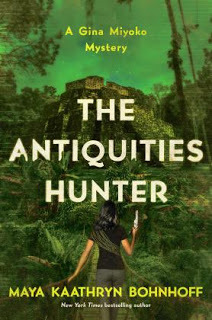 From New York Times bestselling author Maya Kaathryn Bohnhoff, a new private detective series featuring Gina “Tinkerbell” Miyoko, who goes undercover in the Mexican jungle to hunt down a ring of thieves responsible for looting pre-Columbian archaeology sites. Here I chat with Maya about her latest book.
From New York Times bestselling author Maya Kaathryn Bohnhoff, a new private detective series featuring Gina “Tinkerbell” Miyoko, who goes undercover in the Mexican jungle to hunt down a ring of thieves responsible for looting pre-Columbian archaeology sites. Here I chat with Maya about her latest book.Deborah J. Ross: How did you come up with Gina S. Miyoko?
Maya Kaathryn Bohnhoff: I honestly don’t remember except that she arose from a dream I had, the plot of which (yes, my dreams often have plots) I don’t remember. I knew I wanted to write her as the protagonist of a mystery novel, and I knew I wanted her to be different from the female P.I.s I’d read. I love mystery and crime fiction but I noticed that all the female protagonists were alienated and broken and party to dysfunctional relationships. I wanted Gina to be flawed and have enough pain in her life to be relatable, but I also wanted her to be part of a very functional, if quirky family and support network. Among the Japanese names I was considering, Gina Suzu Miyoko meant, “Silver Bell Temple;” Tinkerbell became an inevitable nickname. And her personality just grew out of that.
DR: And Russian Orthodox witches?
MKB: Around the time I was developing Gina and the characters that would surround her, I was reading a book entitled THE BATHHOUSE AT MIDNIGHT: An Historical Survey of Magic and Divination in Russia (WF Ryan). I was reading it because the novel I was working on at the time (MAGIC TIME: ANGELFIRE, from Harper-Voyager) had a Russian ex-pat as one of the central characters. Okay, and also I’m Russian-Polish on my father’s side and have been fascinated with the folklore and history of Slavic culture since I was a child. Probably more so because my grandmother was so adamant that I not be taught anything about the Old Country but be brought up thoroughly American. In any event, the book sparked the idea that I wanted Gina’s mother to be Russian and fascinated by arcana. She was originally going to be a psychologist, but by the time I started writing the book that became THE ANTIQUITIES HUNTER, she had morphed into a cultural anthropologist and folklorist.
As tends to happen with these things, as I began to write the characters, they essentially told me who they were. I’m sure you know the feeling—as if the character is inside your head whispering sweet somethings to your Muse.
DR: Did you research PI procedures like the post-it notes and Who/What/When etc?
MKB: I have to laugh. The post-it note method is something I’ve used to plot novels for years. It seemed to me that my post-it process would be as ideal for working out the nuances of a real world mystery as it is for plotting a novel. My editor suggested editing the scene in which you first see Gina use the post-its so that she just wrote on the white board. I declined and explained the beauty of post-its to her by having Gina demonstrate it for the reader.
DR: How did you become interested in the problem of looting of antiquities? Why the Southwest?
MKB: I have loved archaeology for as long as I can remember. I subscribed for years to Archeology magazine, and KMT (Kemet - which is the old Egyptian name for Egypt). I happened to read an article about a female undercover agent for the National Park Service and the sort of work she and her teammates did, chiefly in the Southwest where there are a lot of vulnerable caches of artifacts, mostly on First Nations land. But I’d also been following several international cases at the time—the Elgin Marbles that the British Museum had to return to Greece and the black market cases that big US auction houses and museums alike had been implicated in. I was also following the rediscovery of the Rosalila (an utterly fantastic nested temple at Copán in the Honduras) and some amazing finds at Bonampak, which is in Chiapas, Mexico.
It was that last item that gave me the location for some of the action in the book. I sort of let all of that percolate and it seemed natural to have my protagonist have the experience I’d dreamed of having—seeing those antiquities first hand. More than that, I wanted her to have a hand in saving some of them. The lack of funding for preserving these sites is a real and persistent problem in the world of archaeology.
DR: These days cultural appropriation is a sensitive topic. How did you go about portraying Hispanic, Asian, and Native characters in a respectful manner?
MKB: I suppose every writer has their own approach; mine is to love the people I write about and to recognize that they’re people first, not representatives or symbols or archetypes of a particular culture. But, in writing them, I have to recognize that their cultural framework will condition their responses to things. So, to Rose Delgado, though she’s married to a non-Hopi, living in Sausalito and working all over the country, she’s still Hopi. That means that Hopi lands are still sacred to her and that she takes the theft of native artifacts personally. Her job is more than just a job because of her cultural background and her investment in it is different than the other members of her team.
To me, Gina’s tattoo is exemplary of the cultural intersectionality I’m portraying. It’s a Russian Orthodox True Believer cross with a Buddha seated at the nexus in a lotus blossom. The cross is for her mom, the Buddha for her dad. Gina calls herself a Russian Orthodox Buddhist, which is an echo of what I told people who asked about my religion before I became a Baha’i. I’d say I was a Hindu-Buddhist-Christian. So, what I was trying to capture in Gina was a character who was an intersection of three cultures—Japanese, Russian and American.
I’ve been privileged to have been surrounded by people from diverse cultures all my life and I think that if you approach characters of any culture with curiosity, love and an attitude of learning, you’ll strive to portray them as complete, three-dimensional human beings.
DR: Is there such a thing as SASH (Society for the Appreciation of Sherlock Holmes), and would you join?
MKB: There’s a Sherlock Holmes Society of London, but as far as I know, there’s none in the Bay Area—at least not like the one Gina’s dad, Edmund, is part of. I made it up. Or maybe Edmund did. I would totally join SASH if there was one around. I loveSherlock Holmes—in fact, I have a Sherlock Holmes pastiche idea I’d love to write.
DR: What have you written recently?
MKB: I’ve been doing a lot ghostwrites lately. And they have been diverse and interesting. I just finished up a YA set in Seattle, and am still working on one that also makes use of my deep love of archaeology. Beyond that, my dear agent is shopping a crazy range of novels I tossed at him, including an SF novel with a peculiar genesis that I’d love to see be the first of a trilogy, a YA paranormal/contemporary fantasy featuring a 14 year-old-protagonist who discovers she's a witch from a long line of witches, a magical realism yarn that is my take on the old Russian fairytale, Frog Princess, and a paranormal romance that I collaborated on with a couple of show runners from LA.
DR: What lies ahead? What lies ahead for Gina Miyoko – are new novels in the works?
MKB: I’ve been working on what I hope will be the next book in the Gina Miyoko series—working title, THE FORGETFUL FOLKLORIST. I’ve got about eight or nine novels sketched out and more ideas popping into my head all the time. I’ve also been outlining a steampunk novel I’d like to write, involving yet more artifacts. (I got the idea from a book cover someone asked me to design, then didn’t want.)
DR: How does The Antiquities Hunter fit into your repertoire of published works?
MKB: It’s a real outlier among outliers. I started out writing science fiction. In fact, I’d published a bunch of stories in Analog before I shifted gears and wrote four epic fantasy novels all based on dreams. Then I discovered magical realism and fell madly in love with it. That caused my writing to take a weird turn that peaked with “The White Dog” (Interzone). In moving over to crime fiction, I’m really pursuing something that’s fascinated me as a reader for years. I’ve been in love with mysteries and detective fiction forever. So, even though THE ANTIQUITIES HUNTER looks like a departure from the outside, from where I sit, I’m just writing what I’ve always read. I also realized, when I looked at the fiction I’ve written, that most of my stories have a mystery embedded at the core—sometimes blatantly, as in “The Secret Life of Gods” and “Distance"(Analog), or in a veiled way as in my novels THE SPIRIT GATE (originally from Baen, in reprint from Book View Cafe) and STAR WARS LEGENDS: SHADOW GAMES (Del Rey/Lucas Books).
DR: What authors have most influenced your writing? What about them do you find inspiring?
MKB: My greatest prose heroes are Ray Bradbury, W.P. Kinsella (whom I cast in DISTANCE with his permission), and Tim Powers. These are the writers whose use of language, storytelling chops, and sheer imagination made me hungry to write. Bradbury and Kinsella have written some of the most beautiful and evocative prose in the English language and Powers has given me epiphanies about the many ways reality can collide with the fantastic.
I admire Dean Koontz, JK Rowling and Sue Grafton as well, especially for their character development chops and the uncanny way they connect the reader to their characters from page one. I also have to credit Harry Turtledove (who’s written some of my favorite Analog stories) with making me stray into alternate history, with my novelette “O, Pioneer” (Paradox) which takes an upside down and backwards look at Christopher Columbus’ ”discovery” of the Americas.
DR: Why do you write what you do, and how does your work differ from others in your genre?
MKB: I write what I do because either a character demands to be written about (Gina Miyoko being a case in point) or an idea demands to be explored. I thrive on exploration. It’s why I love road trips (What’s around that next curve?), research, archaeology (What is that thing I just dug up?), first contact stories, and mysteries of every kind. Writing is exploration I undertake to satisfy my insatiable curiosity about what if.
I’ve been told that I write fantasy with rivets, meaning that my fantasy work tends to take a very pragmatic approach to the fantastic. It works the other way, as well. My Gina Miyoko stories have an undercurrent of the supernatural to them if the reader chooses to read the pragmatic references to obereg (the good luck charms her mom is forever sneaking into her pockets), Holy Water, and spells as being more than just a concession to Nadia Miyoko’s avocation. This means that my fiction often falls through the cracks. When I sent “The White Dog” to Interzone, the editor wrote back and said essentially, ”I loved it, but where’s the fantasy element?” I responded, “In the eye of the reader.” He bought the story and it was a finalist for the British Science Fiction Award.
DR: How does your writing process work?
MKB: Mileage varies … a lot. With short fiction, I’ll sometimes scribble a handful of questions that become notes and when I see a beginning and end, I start writing. With novels, I sometimes get out the sticky notes. I had a great little flow chart app I used for a while, but they stopped making it. I use Evernote to toss bits and pieces into, as well. The sticky note brainstorming is still the best method I’ve found of plotting a novel because it allows me to visualize relationships between characters, their motivations and other plot elements.
Once I’ve charted something that way, I write a synopsis that becomes a living document that I can add to as I work. At some point the characters start yakking and doing things and I have to start writing. I used to have to write everything in #2 pencil on lined paper first, then edit as I committed it to the computer. Then I’d do that until roughly the last third of the book when the boulder started rolling downhill. But for some time now, while I still love writing notes long hand, I do all my writing at the keyboard. I’ve only ever had a laptop, because I feel the need to be portable. Sometimes a silent house is the best place to write, and sometimes a noisy coffee shop is best. I’ve also learned to give myself permission to do what I heard one writer refer to as “moodling”. It looks (and feels) like I’m not doing anything, but my mind is hard at work looking for connections. And when enough connections are made between elements and characters, the writing happens.
Whenever I sit down to write, I always read back what I did previously. I tried Hemingway’s stopping in mid sentence and it only led to frustration.
DR: What advice would you give to an aspiring writer?
MKB: First, write without editing. Ray Bradbury famously said of writing, “Don’t think.” He advised hiding your editor hat and just getting the bones of a story or a scene down without worrying about whether you found the right word. THEN, put on your editor hat and edit. This can make the difference between a story ending up attached to an email on its way to an editor’s inbox or ending up in an obscure file folder.
Second, learn your tools—words. Know what they mean, what they imply, how they taste, how they sound. Read your prose out loud before you submit it. Here, I find Mark Twain’s advice sage: “Use the right word, not its second cousin.”
Third, be flexible. The method you used to write one story may not work for the next one. That’s okay. It doesn’t mean you’re broken or that your process is broken. It just means it’s different this time. This was a hard-learned lesson for me. It took reading Lawrence Block’s learning experience with regard to flexibility (in one of this Writer’s Digest columns), to understand that I wasn’t losing “it”; “it” had just morphed a bit.
I’ve learned a lot from the experiences of other writers and from their prose. One of the most valuable learning experiences for me is to read other writers’ prose with an awareness of my own responses to it and analyze why it makes me feel how I feel. Then I try to apply that in my own work.
Oh, and when you’ve written that story and read it out loud, making sure that (as Twain said) you’ve used the right word, not its second cousin, send it to the magazine or agent or publisher you really want to see it with, not something less. When I sent my first story to Stan Schmidt at Analog, the wisdom in all the writing magazines I’d read was that I should send it to a small non-pro market first and work my way up. And I should send something short that stood a better chance of being accepted. I went against that advice and sent a 19,500 word novella to my favorite magazine and got accepted.
Short form: Always shoot for the moon.
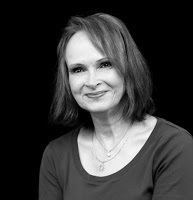 Maya Kaathryn Bohnhoff is the award-winning author of short fiction that has appeared in publications such as Analog and Interzone. She has authored a number of Star Wars novels, including the New York Times bestseller The Last Jedi. Maya lives in San Jose, California.
Maya Kaathryn Bohnhoff is the award-winning author of short fiction that has appeared in publications such as Analog and Interzone. She has authored a number of Star Wars novels, including the New York Times bestseller The Last Jedi. Maya lives in San Jose, California.Buy links for all online sources are on the Pegasus page: http://pegasusbooks.com/books/the-antiquities-hunter-9781681778570-hardcovera
Or: Print: IndieBound, Barnes & Noble, AmazoneBook: Amazon, Barnes & Noble, Apple

Published on October 09, 2018 01:00
October 8, 2018
Sword and Sorceress 33 Author Interviews: Lorie Calkins
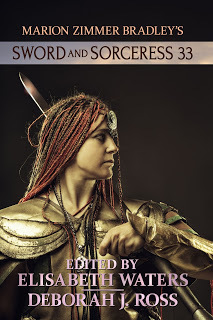 Enter a wondrous universe…the latest volume of Sword and Sorceress, featuring stories from new and seasoned authors. Herein you will find tales of fantasy with strong female characters, with some version of either martial skill or magic. Not all the protagonists will be human, and sometimes the magic will take highly original forms, but the emotional satisfaction in each story and in the anthology as a whole, remains true to the original vision. The release date will be November 2, 2018.
Enter a wondrous universe…the latest volume of Sword and Sorceress, featuring stories from new and seasoned authors. Herein you will find tales of fantasy with strong female characters, with some version of either martial skill or magic. Not all the protagonists will be human, and sometimes the magic will take highly original forms, but the emotional satisfaction in each story and in the anthology as a whole, remains true to the original vision. The release date will be November 2, 2018. ePub: https://www.books2read.com/u/b62gG6Kindle: https://amzn.to/2NitlHH
Deborah J. Ross: Tell us a little about yourself. How did you come to be a writer?Lorie Calkins: I’ve been writing since I was about three. I would scribble in a blank notebook, trying to make lines that looked like my parents’ handwriting.Then I’d “read” it back and tell my stuffed animals what the “story” said. Sure wish I had recorded those tales in a more reproducible manner. My stuffed animals thought they were Really Good.The writing comes pretty easily for me, actually. The two things that are absolute hell for me are determining whether the stuff I wrote is worth showing to anyone,and trying to sell it.
DJR: What inspired your story in Sword and Sorceress 33? LC: I like to turn things inside out and see what color the lining is. You never know what you’ll find. Fairy tales are fun like that, because everyone already thinks they know how the story goes. DJR: What authors have most influenced your writing? What about them do you find inspiring? LC: Sadly, I only find bad authors inspiring. If I throw the book at a wall – and let me tell you that does not do any good for my Paperwhite – then I think, “I can write better than that idiot,” and I am tempted to send out one of my manuscripts. But when I read someone good, like Peter S. Beagle, I feel so inferior I tuck my unfinished story in a drawer and go clean the house. My family knows if I’m cleaning, it’s not a good time to ask anything, just tiptoe away. DJR: Why do you write what you do, and how does your work differ from others in your genre?LC: I like to write fantasy or science fiction, because I can make the characters think and do what I say. Not that they don’t take over and do things that surprise me, but the things they do are likely to be something I can make sense of, becauseI put together their cogs and timing chains.I find real life baffling, and don’t always know where people are coming from, so it’s easier if I can make up the world to work the way I want it to.
DJR: How does your writing process work? LC: The first thing I do is make a list of “what if” ideas – brainstorm style, where anything goes, no matter how ridiculous. Then I try to stretch them into plots, play with any of them that appeal to me, mix and match. If anything goes more than a sentence or two in my head, or two characters get talking, I grab a pen and paper and start writing it down. Sometimes that carries right through to the end, but often I get about two thirds of the story and have to pound my head against the brick wall until I find a way to solve the problem and end the story. Typing it into the computer cleans it up and fleshes it out. If I can figure out what I wrote in the heat of ecstatic creation. One of the story notes I made that still confounds me is, “Put a fish in here, Lor.” A fish?
DJR: What advice would you give an aspiring writer?LC: The world of writing and publishing contains many kind and helpful people who are eager to help newbies and pay forward the help they received. It also harbors vast numbers of people who only see suckers and want to take advantage. I’ve found it hard to tell the difference sometimes, and paid the price. I would tell a wannabe, “Bah. Go to school. Learn something useful.” Or maybe, “Here’s a hammer. Hit yourself with it repeatedly, and it will feel the same as the road to getting published.” If they are among those who have to write, can’t stay away from writing, and are prepared to suffer the consequences, I would tell them to try the traditional route first, sending to established publishers,
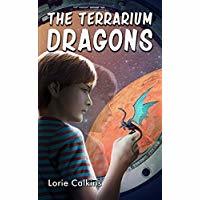 Lorie Calkins’s first pro short story sale, “Oops,” was to Marion Zimmer Bradley’s Fantasy Magazine in 1994, for issue #30.Her stories are also in Sword and Sorceress anthologies 19, 28, 31, and 32, as well as many short stories in various magazines, and a science fiction book for children, The Terrarium Dragons. Besides the medium of words, Lorie likes making things in wood, fabric, glass, yarn, or metal, but above all, she enjoys spending time with her grandchildren.
Lorie Calkins’s first pro short story sale, “Oops,” was to Marion Zimmer Bradley’s Fantasy Magazine in 1994, for issue #30.Her stories are also in Sword and Sorceress anthologies 19, 28, 31, and 32, as well as many short stories in various magazines, and a science fiction book for children, The Terrarium Dragons. Besides the medium of words, Lorie likes making things in wood, fabric, glass, yarn, or metal, but above all, she enjoys spending time with her grandchildren.Lorie and her husband live with Magic and Chaos, two Miniature Schnauzers who fully live up to their names. Their home is on Whidbey Island in Washington State.

Published on October 08, 2018 01:00
October 5, 2018
Short Book Reviews: Imagination as a Super Power
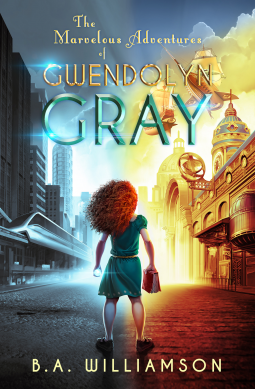 More wonderful Middle Grade reading...The Marvelous Adventures of Gwendolyn Gray, by B. A. Williamson (Jolly Fish)
More wonderful Middle Grade reading...The Marvelous Adventures of Gwendolyn Gray, by B. A. Williamson (Jolly Fish) This delightful adventure crosses worlds of imagination with a singularly creative young heroine. At times the settings reminded me of A Wrinkle in Time, Kidnapped, Peter Pan, and The Never-Ending Story, to name a few. Humor tempers the seriously creepy villains, and the dramatic story moves right along with more than its share of twists and turns. Gwendolyn Gray is not only a resourceful and sympathetic heroine, but someone I would have loved to play with as a child. My only reservation about the book concerns the audience, since Gwendolyn is adolescent, but the length of the book and the complexity of the world place it more in the YA/teen niche. Regardless, I look forward to more imagination-fueled adventures.

Published on October 05, 2018 01:00
October 3, 2018
Today's Moment of Art
Published on October 03, 2018 01:00
October 2, 2018
NORTHLIGHT on sale, this week only!
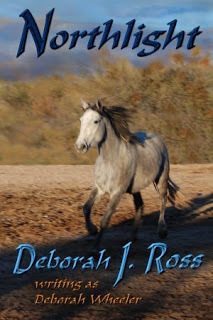
October 2-8, 2018, Nortlight in multi-format ebook edition from Book View Cafe for only $1.50.
She’s a Ranger, a wild and savvy knife-fighter, determined to get help in finding her partner who’s lost on the treacherous northern border. He’s a scholar who sees visions, eager to escape the confines of city life and the shadow of his charismatic mother. With the assassination of a beloved leader and the city in turmoil, the two have only each other to turn to. What begins as a rescue mission turns deadly as together they unravel the secret that lies beneath Laurea’s idyllic surface.
REVIEWS“A beautifully constructed fantasy with characters who grow and mature before the reader’s eyes and who are engagingly human while being fantastically heroic. Her writing flows and the point of view switches are interesting and exciting. This book is a keeper.” — Rickey Mallory, Affair de Coeur“A style and manner reminiscent of McCaffrey’s Crystal Singer series.” — The Bookwatch“An unusual saga that starts slowly but builds to a startling climax.” — Sherry S. Hoy, Kliatt“Solid characters and a well-designed world make for good reading.” — Philadelphia Press“The plot moves briskly from crisis in Laureal to capture by the Norther barbarians to discovery of the true meaning of the Northlight of the title, with ample foreshadowing from the mysterious spooky something in the air of the frontier. And the culmination quite satisfactorily evokes the sense of wonder.” –Tom Easton, Analog

Published on October 02, 2018 01:00
October 1, 2018
Sword and Sorceress 33 Author Interviews: Jessie Eaker
 Enter a wondrous universe…the latest volume of Sword and Sorceress, featuring stories from new and seasoned authors. Herein you will find tales of fantasy with strong female characters, with some version of either martial skill or magic. Not all the protagonists will be human, and sometimes the magic will take highly original forms, but the emotional satisfaction in each story and in the anthology as a whole, remains true to the original vision. The release date will be November 2, 2018.
Enter a wondrous universe…the latest volume of Sword and Sorceress, featuring stories from new and seasoned authors. Herein you will find tales of fantasy with strong female characters, with some version of either martial skill or magic. Not all the protagonists will be human, and sometimes the magic will take highly original forms, but the emotional satisfaction in each story and in the anthology as a whole, remains true to the original vision. The release date will be November 2, 2018. ePub: https://www.books2read.com/u/b62gG6Kindle: https://amzn.to/2NitlHH
Deborah J. Ross: Tell us a little about yourself. How did you come to be a writer?Jessie Eaker: When I was in elementary school, I would painstakingly write out my thoughts and stories, along with accompanying illustrations, and keep them in a special binder which I fantasized about publishing. I loved making up stories about rockets, robots and dragons. (I didn't much care for unicorns--they were too hard to draw.) When I hit middle school and on into high school, I entered what I now consider my great input phase--I read everything I could get my hands on. And out of that I began to craft my first stories. But as fate would have it, one of my high school English teachers gave a very harsh criticism of one of my works. I was devastated--my fantasy of being published evaporating in a moment. But then I got angry. My story couldn't be that bad. I resolved right then and there that I was going to prove to that I could be a published author. Of course, it took me another fifteen years to actually develop enough to pull it off.
DJR: What inspired your story in Sword and Sorceress 33?JE: "All In a Name" was inspired by my youngest daughter's pregnancy and their search for a suitable name for the baby.While they offered us hints as to what it might be, she and her husband had decided they would keep the name secret until the baby was born. It nearly drove us crazy not knowing and we feared it would be some off-the-wall name that would permanently scar the child.
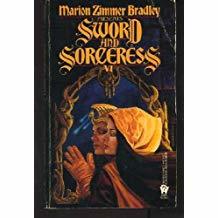 During this time I pondered the power in a name. I had dealt with this idea before in a prior story, "Name of the Demoness" in Sword and Sorceress #6. But thinking of the coming child, I came up with a new direction to take this idea.
During this time I pondered the power in a name. I had dealt with this idea before in a prior story, "Name of the Demoness" in Sword and Sorceress #6. But thinking of the coming child, I came up with a new direction to take this idea.And by the way, the name they chose for my newest granddaughter was perfectly lovely.
DJR: Why do you write what you do, and how does your work differ from others in your genre?JE: I love fantasy and science fiction. From my first comic books as a kid, I was fascinated with all things outside our present-time reality. So naturally, I write primarily in those genres. Early on I became intrigued with the differences between straight up fantasy and technology based fiction. While we tend to treat them differently, I believe that they are one in the same. So when I can, I like to take science fiction elements and mix them with my fantasies. Admittedly, some stories allow this more than others.Also, I absolutely love strong women characters. I try to make every female character in my stories have a depth to them that the reader can appreciate.
DJR: What have you written recently? What lies ahead?JE: What I like to write has evolved over time. In my younger days, I tended to write "serious" works and strove to turn out text that would be leave the reader awestruck. But I found trying to be the next great author quickly lost its luster and it became harder and harder to produce anything I truly liked. My busy life offered the perfect excuse and so I put aside my writing for several years.
Then as I was cleaning up, I ran across one of those stories that I had drafted but never finished. It was a lighter fare, a fantasy adventure, which I had cast aside as not being "serious" enough. That was when I said, to hell with it and took it back up. And you know what? I had a blast. I rediscovered the absolute joy in writing. That one story grew and morphed into two novels with at least two more coming.
I would say my writing now is more fun and more confident. While I think my writing voice was good before, it is definitely better now.
DJR: What advice would you give an aspiring writer?JE: I think there are three basic things an aspiring writer should do. The first is to doggedly write every day whether you feel like it or not. All writers give this advice, but it's really true. The second thing is a variation of the "write what you know" saying. I would say instead to write what you like. This of course, assumes you are knowledgeable of the area you like. And if you aren't, you might want to fix that first. Thirdly, and this is the most important, keep a notepad beside your bed to capture your ideas. Like all mystical things, truly good ideas are rare and fleeting. So you must be ready for when they arise.

Published on October 01, 2018 01:00
September 28, 2018
Short Book Reviews: Magic, Medicine, and PTSD
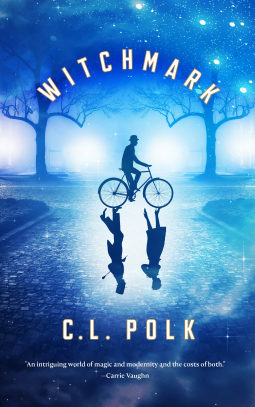 Witchmark, by C. L. Polk (Tor) is one of the most unusual and compelling love stories I’ve read this year. The setting, very much like England in the throes of national PTSD following the First World War, a magic-yielding aristocracy, a conflicted hero, and so forth, are familiar enough to be recognizable, yet integrated into a freshly imagined world.
Witchmark, by C. L. Polk (Tor) is one of the most unusual and compelling love stories I’ve read this year. The setting, very much like England in the throes of national PTSD following the First World War, a magic-yielding aristocracy, a conflicted hero, and so forth, are familiar enough to be recognizable, yet integrated into a freshly imagined world. A brutal war has dragged on to end in a draconian peace. Men returning from the front are all too often shattered in mind as well as body, although the effects of their trauma are poorly understood. In our own world, WW I veterans were said to suffer from “battle stress” or “shell shock,” and both were associated with cowardice or lack of moral strength. In this world, however, some of them carry a spiritual darkness within them, visible only to those with magical sight. One such is our hero, working as a physician under an assumed name to escape the enslavement of being a “second-class” magician. He alone makes a connection between the dark presence and the reports of his patients that a mysterious he wants them to murder their loved ones. Creating a metaphor for dissociation born out of guilt and trauma is one of the things I love about fantasy. In this case the darkness is also a real, separate thing, related to the retaliation plotted by the losing side in the war, but again, I found myself wondering at the parallels between Polk’s vengeful, decimated vanquished and the rise of the Nazi Party following the Treaty of Versailles. One of the hallmarks of thoughtful fantasy is how it invites us to look at our own world, our own lives, through new perspectives.
Witchmark, however, is not at all a diatribe about the root causes of war. It’s an intensely personal story of a man who, fleeing one sort of persecution (the exploitation of his magical talents), dedicates himself to healing and then, without meaning to, gets caught up in increasingly larger crises. Through this all, he forges a connection-of-the-heart with a man of another race, an Amaranthine, this world’s version of Fae. Like Fae, they are immortal or nearly so, and are said to be incapable to loving as humans do. All of this makes the slowly evolving love story between Miles Singer and Tristan Hunter both tender and bittersweet.
The book has a lot of different elements, from the murder mystery that launches the action to the politics of the hospital where Miles works, to the aristocratic magic-wielders who subjugate those of lesser talents, to the international politics, to the bicycles criss-crossing the city. It would all be too much in the hands of a less skillful author, but Polk introduces each aspect of the setting, characters, traditions, and drama in such an easy, natural fashion, they all fit effortlessly.

Published on September 28, 2018 01:00
September 26, 2018
Today's Moment of Art
Published on September 26, 2018 01:00





